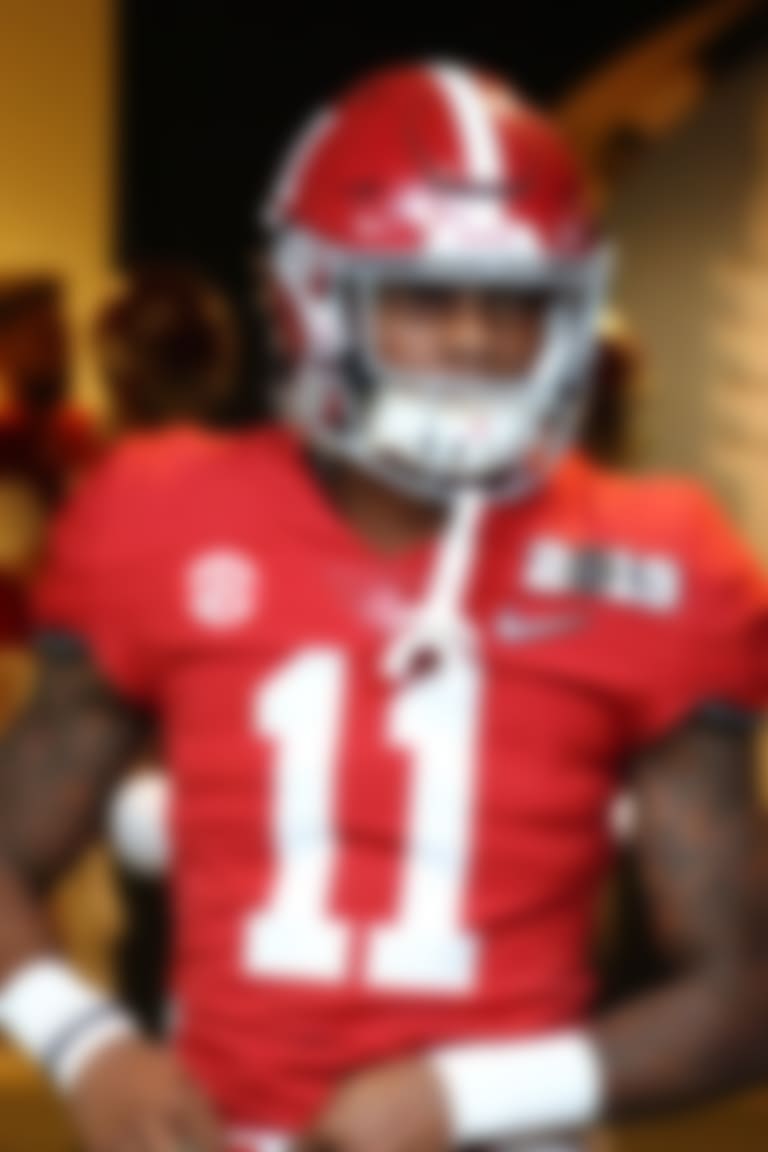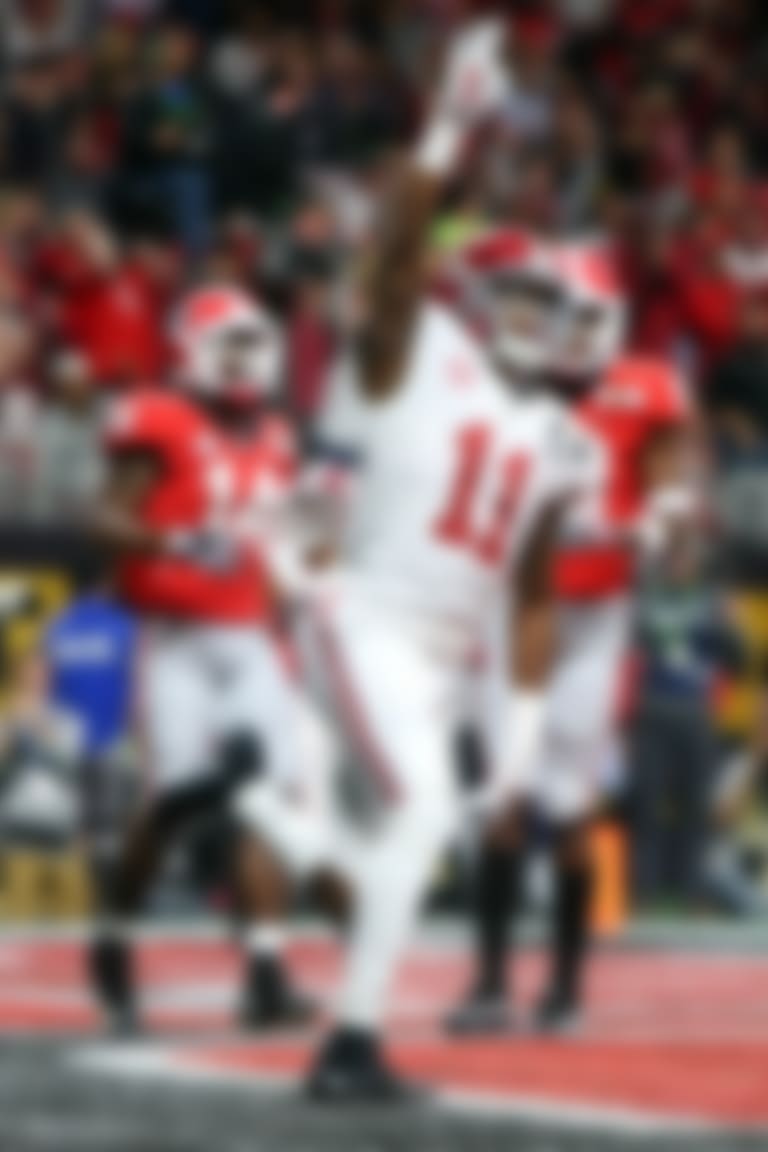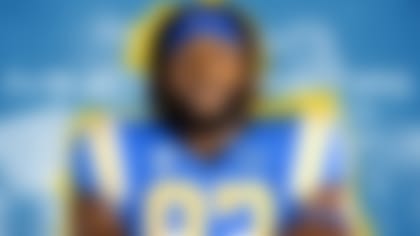Henry Ruggs honors the memory of Rod Scott with a three-finger salute after every touchdown, but Alabama's star wide receiver also carries guilt for not having died alongside his best friend
By Chase Goodbread | Published Aug. 27, 2019
MONTGOMERY, Ala. -- Henry Ruggs stood in the center of Powelldale Drive, in the middle of the night, distraught with boiling emotion as a shouting match with his mother escalated. For the better part of a year, he'd kept quiet about his feelings regarding the death of his best friend, Rod Scott, and all the reasons he blamed himself for it.
In the weeks after the car accident that took Scott's life in March 2016, Ruggs tried grieving, hours upon hours, at the gravesite. He tried burrowing himself in his bedroom for days. Even many months later, when he announced his commitment to sign with the University of Alabama in a video tribute to Scott, he still wasn't ready to talk about it.
"I'm a bottled-up person," Ruggs said. "I keep a lot to myself."
But on this night, more than a year after the accident, there would be no privacy. His mother, Nataki, was finally demanding answers to some hard questions. And as the argument spilled from the Ruggs' home into the street, a few neighbors came outside to see what the commotion was.
Ruggs paced the asphalt. Running -- from problems, from uncomfortable situations, from anything he didn't want to be a part of -- had always been a way out for the Crimson Tide's star wide receiver. He learned at an early age that nobody could catch him when he turned on his natural gift for speed. If he angered his siblings, their first thought wasn't to come at him; it was, first, to block his exit. He used to approach the neighborhood dogs and baited them to chase him, just for the thrill of pursuit.
But there was no running from what happened to Rod Scott, at least not on that night.
Two years have passed since that evening, and Ruggs is now one of the most explosive offensive threats in college football. NFL scouts are enthralled with him as a draft prospect, and he'll decide at season's end whether to enter the 2020 NFL Draft as an underclassman. He'll begin what could be his final college season on Saturday when Alabama plays Duke in the Kickoff Classic in Atlanta.
Scott, he believes, put him in that position. And keeping his best friend's memory alive through that pursuit has become what he lives for.
At the crack of dawn, Roderic Scott would have the doors open.
Ruggs' determination to be an NBA point guard was born here, at the Southeast YMCA, before hundreds of sunrises over Carter Hill Road in the Brentwood area of Montgomery, Ala. It stands next to Dannelly Elementary School, which didn't open its doors to students until 7:45 a.m., and Ruggs could shoot baskets at the Y until the school bell rang. If he got there at 7, the doors would be open. At 6? Door's open. Scott worked the front desk at the Y and did his best to make it a place where the neighborhood kids could stay off the street and out of trouble. If that meant opening early, that's what it meant.
Morning after morning, Rod Scott, Roderic's son, would launch his first shot before his dad could get all the lights turned on. The next kid to walk in the gym was usually Ruggs. When the Dannelly school bell rang at day's end, the pair ran straight back to the Y for more basketball. Scott's work ethic for the sport, even at a young age, was unlike anything Ruggs had ever seen. He was a year older than Ruggs, and a year wiser, too. Ruggs began getting his hair cut the way Scott did.
"They were best friends, but Henry always looked up to Rod," said Nataki.
In time, the two formed a bond that transcended basketball; they were not only inseparably close, they even adopted one another's mannerisms. They'd pick up breakfast at Starbucks before school together, and always ordered the same thing. They dressed alike, were roughly the same size, and even resembled each other. Years later at Lee High in Montgomery, to amuse themselves, they'd sometimes switch jerseys at basketball practice and answer to each other's names. They even had a few hand signals they used when they didn't want the rest of the room in on their communication. For those who didn't know them personally, they were often mistaken as brothers or even twins.
"As much as they could be together, they got together. It's like they were the same person," said Ruggs' brother, Kevontae.
Scott worked on his shot incessantly and eventually drew scholarship offers. Ruggs possessed incredible leaping ability, with a vertical jump of 40 inches. In their first season playing varsity basketball together, Ruggs was only a sophomore. He logged an estimated 40 dunks in game action at just 5-foot-9. Alley-oop passes from Scott to Ruggs, with chemistry and timing mastered over years at the Y, were always perfect.
Football was never Ruggs' sport, at least not until the day Scott convinced him it should be.
The stretch of I-65 North was slick with a steady rain on March 3, 2016, as the white Toyota Camry that Scott was riding in approached mile marker 221. The destination for five teenagers: Legacy Arena in Birmingham, to support the Montgomery Jeff-Davis girls' basketball team in a Class 7A state championship game.
Scott was one of three unrestrained backseat passengers, sitting between two friends when the car began to hydroplane shortly after 10 a.m., about halfway between Montgomery and Birmingham in Clanton, Ala. At a speed estimated by one occupant at 80 mph, the driver lost control and the car rolled over four times, resulting in an unspeakable tragedy. Scott, a high school senior who had signed to play basketball for Jacksonville State, was thrown some 50 yards from the vehicle and later died of head injuries.
Darian Adams, a former teammate of Scott's who now plays basketball for Troy University, was in that backseat, sitting behind the driver and to Scott's left. He was thrown from the vehicle as well, and his account of the accident is chilling.
"Rod was lighter than me, so I think he flew farther," Adams said. "I think I went through the windshield and he went through the sun roof, or it was the other way around. It was an awful experience. I asked the medics about Rod, and they wouldn't tell me anything."
IT DIDN'T EVEN LOOK LIKE A CAR ANYMORE. THE SIDES WERE CRUSHED IN, THE ROOF WAS SMASHED DOWN, ALL THE GLASS WAS GONE. DARIAN ADAMS
It was a horrifying lesson in the importance of seatbelt safety: the driver and front-seat passenger, both buckled, suffered concussions and otherwise minor injuries. The three unbuckled teens in the backseat were all ejected; Scott died, Adams broke his neck, and the third spent months in a back brace. Adams underwent immediate surgery for broken C4 and C5 vertebra, but thankfully recovered full mobility; he led the Troy men's basketball team in assists last year with a permanent metal plate in his neck.
Along with head trauma, Scott also suffered collapsed lungs and underwent multiple surgeries after being airlifted to Montgomery's Baptist Medical Center South, where he died the following day.
"I knew if he couldn't be fully active the way he used to be, he wouldn't want that kind of life if it was just going to be halfway," said his father, Roderic. "We didn't have to make that decision. He was gone, but they got him on life support so we could say goodbye."
As he was being loaded onto an ambulance, Adams got a glimpse of the Camry.
"It didn't even look like a car anymore," he said. "The sides were crushed in, the roof was smashed down, all the glass was gone. There was no fixing that car."
Scott's death sent shockwaves through Lee High -- though he'd only been at the school for two years after transferring, he'd ingrained himself in the Class of 2016 not only on the basketball floor, but in the hallways with an engaging personality. The Montgomery Public School System dispatched more than a dozen grief counselors to Lee, setting them up in the school library. Enough students took advantage of the opportunity to pack the library for days following Scott's death.
"You're supposed to get closure, but I don't think this school got it," said Lee basketball coach Bryant Johnson. "It's still fresh for a lot of people."
After three years of advocacy from the Scott family, a new state law requiring backseat passengers to wear a seat belt, named for Scott, passed this summer and was signed into law by Gov. Kay Ivey in June.














